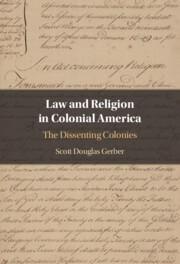Book contents
- Law and Religion in Colonial America
- Also by Scott Douglas Gerber
- Law and Religion in Colonial America
- Copyright page
- Dedication
- Epigraph
- Contents
- Tables
- Acknowledgments
- A Note on Methodology
- Introduction English Law about Religious Toleration Prior to the Planting of Colonial America
- 1 Law and Catholicism in Colonial Maryland
- 2 Law and the Lively Experiment in Colonial Rhode Island
- 3 Law and the Holy Experiment in Colonial Pennsylvania
- 4 Law and Congregationalism in Colonial Connecticut
- 5 Law and a City Upon a Hill in Colonial Massachusetts
- Conclusion Law, Religion, and Historiography in Colonial America
- Works Cited
- Table of Laws
- Index
4 - Law and Congregationalism in Colonial Connecticut
Published online by Cambridge University Press: 19 October 2023
- Law and Religion in Colonial America
- Also by Scott Douglas Gerber
- Law and Religion in Colonial America
- Copyright page
- Dedication
- Epigraph
- Contents
- Tables
- Acknowledgments
- A Note on Methodology
- Introduction English Law about Religious Toleration Prior to the Planting of Colonial America
- 1 Law and Catholicism in Colonial Maryland
- 2 Law and the Lively Experiment in Colonial Rhode Island
- 3 Law and the Holy Experiment in Colonial Pennsylvania
- 4 Law and Congregationalism in Colonial Connecticut
- 5 Law and a City Upon a Hill in Colonial Massachusetts
- Conclusion Law, Religion, and Historiography in Colonial America
- Works Cited
- Table of Laws
- Index
Summary
This chapter explores the relationship between the animating principle of colonial Connecticut—Puritan Congregationalism—and the colony’s laws. Part I chronicles how central Puritan Congregationalism was in the organic law, statutory law, and common law of the River Colony at which Connecticut was originally planted. Part II investigates the law of the New Haven Colony, a separate community settled in 1638 that joined with the River Colony in 1665 to create a unified Connecticut Colony. Part III examines the law of the unified Connecticut Colony and endeavors to discern when Connecticut’s laws began to deviate from Puritan Congregationalism. Part IV concludes the chapter by assessing the events that led to the official demise in the Connecticut Constitution of 1818 of Puritan Congregationalism as the animating principle of Connecticut. As will be seen, the law of colonial Connecticut eventually came to reflect the idea of religious toleration sweeping, albeit unevenly and imperfectly, across the larger Atlantic World.
Keywords
- Type
- Chapter
- Information
- Law and Religion in Colonial AmericaThe Dissenting Colonies, pp. 134 - 178Publisher: Cambridge University PressPrint publication year: 2023

